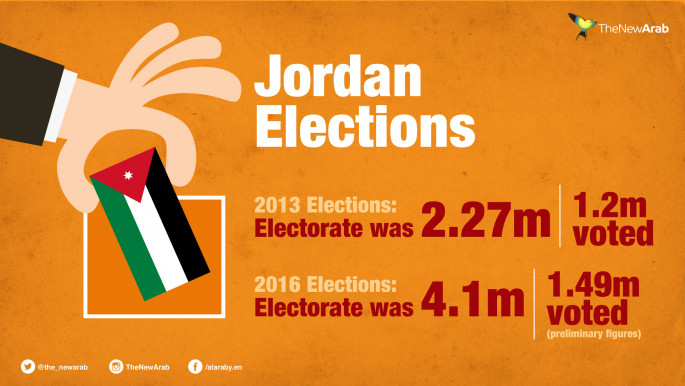Fraud allegations mar 'credible' Jordan election
Violence, vandalism and vote-buying drove down voter turnout in Tuesday's parliamentary elections in Jordan, observers have noted.
Gunshots and alleged fraud outside some polling stations marred an otherwise credible ballot, said experts and officials.
"Some minor incidents have been reported from some areas, like clashes between supporters of rival candidates and shots in the air outside one polling station," said General Atef al-Saudi, Jordan's national security director.
Despite polling stations staying open for an extra hour, just 36 percent of eligible voters headed to the polls, a lower proportion than in the 2013 vote - with little enthusiasm on show over electing a parliament with limited powers to affect government policy.
A new electoral system intended to strengthen political parties has been heralded as a small step for democracy in the kingdom.
Significant drop
Election rules were revised to allow political parties to run lists, rather than a "single vote" system that benefited tribal candidates.
After polls closed at 8.00pm (1700GMT), the electoral commission said 1.49 million people had voted based on preliminary figures, compared with 1.2 million in the last election in 2013.
However, where Jordanians previously had to register to take part, now all those over 18 were eligible to vote, increasing the electorate by some two million people - causing the percentage turnout to significantly drop.
"It's hard to say the turnout was less or more than expected as it was the first time Jordan has held an election utilising this format," said Scott Mastic, regional director for the Middle East and North Africa at the International Republican Institute, which deployed 44 observers to the country.
Disillusionment
He told The New Arab: "There are some significant challenges with voter apathy and disillusionment in Jordan.
"It's tied to public perception about the relevance of parliament being an effective and relevant institution. The 36 percent turnout is reflective of the larger context."
| Read more: Independents vs parties: Polls to test Jordan's electoral reforms |
King Abdullah II can appoint and sack the country's military and intelligence chiefs, senior judges and members of parliament's upper house without government approval.
The election was also the first time the Islamic Action Front - the Jordanian arm of the Muslim Brotherhood - has participated since 2007, having boycotted previous votes in protest at the electoral system.
The result could see the movement return as a major parliamentary force, with experts predicting it will claim 20 of 130 seats.
Common complaint
On Tuesday, the IAF complained of "several" irregularities during the election, including vote-buying, which it said had taken place openly outside polling stations.
Jordan's Independent Electoral Commission said it was investigating the allegation, a common complaint in past elections.
It added that one district south of Amman had its results nullified after vandals destroyed ballot boxes.
But Mastic said observers from his delegation did not see instances of vote-buying "first-hand", adding: "The perception of vote-buying in Jordan has thwarted public confidence in elections over the last decade. I don't know if that's changed very much since 2013."
| Photos: Jordanians go to the polls |
"Jordan produced a credible election on an administrative level. It took place in a largely peaceful atmosphere until now. I say 'until now' as it could still encounter complications when the vote is announced."
Electoral commission chief Khaled Kalalda gave no specific timetable for final results.
Schools used as polling stations will remain closed on Wednesday and Thursday "to complete the electoral process", the government said.
Voters picked 130 lawmakers from among 1,252 candidates to serve a four-year mandate.
Agencies contributed to this report.
![Jordan election 2016 [Getty] Jordan election 2016 [Getty]](/sites/default/files/styles/large_16_9/public/media/images/94C12B50-8976-43F4-9613-1B3C778F94B8.jpg?h=d1cb525d&itok=1XCkus-T)


